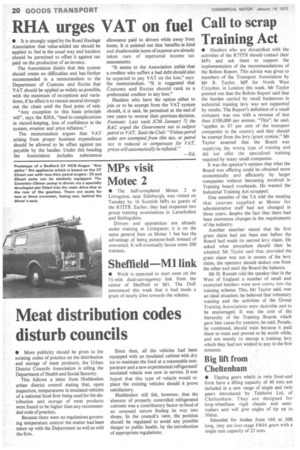Meat distribution codes disturb councils
Page 22

If you've noticed an error in this article please click here to report it so we can fix it.
• More publicity should be given to the existing codes of practice on the distribution and storage of meat products, the Urban District Councils Association is telling the Department of Health and Social Security.
This follows a letter from Hoddesdon urban district council stating that, upon inspection, temperatures in insulated vehicles of a national food firm being used for the distribution and storage of meat products were found to be higher than any recommended code of practice.
Because there were no regulations governing temperature control the matter had been taken up with the Detertment as well as with the firm. Since then, all the vehicles had been equipped with an insulated cabinet with dry ice to maintain the food at a reasonable temperature and a new experimental refrigerated/ insulated vehicle was now in service. It was hoped that this type of vehicle would replace the existing vehicles should it prove satisfactory.
Hoddesdon still felt, however, that the absence of properly controlled refrigerated cabinets was a contributory factor to food of an unsound nature finding its way into shops. In the council's view, the position should be regulated to avoid any possible danger to public health, by the introduction of appropriate regulations. • Hauliers who are dissatisfied with the activities of the RTITB should contact their MPs and ask them to support the implementation of the recommendations of the Bolton Report. This advice was given to members of the Transport Association by Mr R. Taylor, MP for North West Croydon, in London this week. Mr Taylor pointed out that the Bolton Report said that the burden carried by small businesses in industrial training levy was not supported by results. The Report's definition of a small company was one with a revenue of less than £100,000 per annum. "This", he said, "applies to 87 per cent of the transport companies in the country and they should be exempt from the levy /grant system." Mr Taylor asserted that the Board was supplying the wrong type of training and did not offer the specialized training required by many small companies.
It was the speaker's opinion that what the Board was offering could be obtained more economically and efficiently by larger companies without becoming involved in Training board overheads. He wanted the Industrial Training. Act scrapped.
One member of the TA told the meeting that courses supplied at Motec for administrative staff had not changed in three years, despite the fact that there had been enormous changes in the requirements of the industry.
Another member stated that his first grant claim had not been met before the Board had made its second levy claim. He asked what procedure should then be adopted. Mr Taylor said that, provided the grant claim was not in excess of the levy claim, the operator should deduct one from the other and send the Board the balance.
Mr H. Russett told the speaker that in the West of England a number of small and exempted hauliers were now opting into the training scheme. This, Mr Taylor said, was an ideal situation; he believed that voluntary training and the activities of the Group Training Associations were desirable and to be encouraged. It was the cost of the hierarchy of the Training. Boards which gave him cause for concern, he said. People, he continued, should train because it paid them to train and proved to be worth while, and not merely to recoup a training levy which they had not wished to pay in the first instance.
















































































































